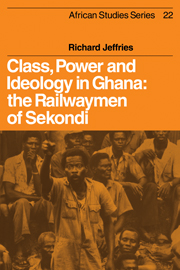Book contents
- Frontmatter
- Contents
- List of maps and tables
- Acknowledgements
- Introduction
- Part I A political history of Ghanaian railway unionism
- 1 The railway and harbour workers of Sekondi-Takoradi: a sociological profile
- 2 The origins and dynamics of Railway Union development
- 3 The railway workers in the nationalist movement – the meaning of political commitment
- 4 The politics of TUC reorganisation under the CPP regime
- 5 The railway workers' response to CPP socialism: the strike of 1961
- 6 The development of an independent and democratic trade union movement
- 7 The railway workers divided: the sources and structure of political conflict in the Railway Union
- Part II Class, power and ideology
- Conclusion
- Appendix: Survey questionnaire administered to a sample of railway workers at Sekondi Location
- Notes
- Bibliography of sources cited
- Index
3 - The railway workers in the nationalist movement – the meaning of political commitment
Published online by Cambridge University Press: 30 September 2009
- Frontmatter
- Contents
- List of maps and tables
- Acknowledgements
- Introduction
- Part I A political history of Ghanaian railway unionism
- 1 The railway and harbour workers of Sekondi-Takoradi: a sociological profile
- 2 The origins and dynamics of Railway Union development
- 3 The railway workers in the nationalist movement – the meaning of political commitment
- 4 The politics of TUC reorganisation under the CPP regime
- 5 The railway workers' response to CPP socialism: the strike of 1961
- 6 The development of an independent and democratic trade union movement
- 7 The railway workers divided: the sources and structure of political conflict in the Railway Union
- Part II Class, power and ideology
- Conclusion
- Appendix: Survey questionnaire administered to a sample of railway workers at Sekondi Location
- Notes
- Bibliography of sources cited
- Index
Summary
Most of the literature on African trade unionism emphasises the influence of the nationalist experience on the subsequent development of relations between post-Independence governments and labour movements. The close affiliation of the labour movement to the ruling party after Independence, as in Ghana, is held by some writers to have resulted from the close ties forged between such parties and the unions in the period of nationalist agitation. Other writers, notably Berg and Butler, have argued that, in Ghana as in most other African countries, the unions displayed a marked lack of political commitment in the nationalist period. This is said to explain their reluctance to accept party control in the period immediately after Independence, a control successfully asserted only because of the unions' inability to resist.
Both positions, it should be noted, tend to assume that political involvement in the nationalist movement, where it existed, implied commitment to a particular political party. Such an assumption should perhaps not be so glibly made. Both also posit a simple continuity in relations, or preferred relations, between unions and parties in the two eras. Yet it should be fairly obvious that such ties as predated Independence (or the period of ‘diarchy’) changed radically when the party became the state, and the superficial unity of the nationalist period gave way to an increasingly manifest differentiation of interests.
The case of the railway workers of Sekondi-Takoradi brings home in vivid manner the false simplicity of both of these arguments.
- Type
- Chapter
- Information
- Class, Power and Ideology in GhanaThe Railwaymen of Sekondi, pp. 38 - 57Publisher: Cambridge University PressPrint publication year: 1978



